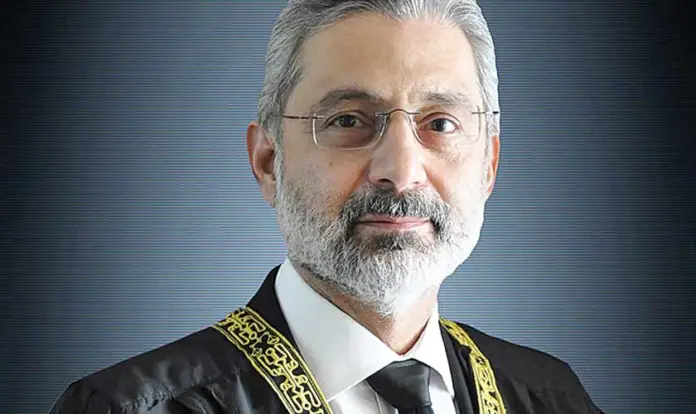By a vote of two to one, a special Supreme Court bench issued an order on Wednesday suspending all suo motu cases under Article 184(3) of the Constitution until the Supreme Court Rules regulating the Chief Justice’s discretionary powers are amended.
The suo motu case reviewing the award of 20 more marks to a Hafiz-e-Quran student when admitting them for an MBBS/BDS degree is what prompted the special bench ruling. The bench was presided by Justice Qazi Faez Isa and included Justice Amin-ud-Din Khan and Justice Shahid Waheed.
Justice Isa objected to the bench’s formation when Chief Justice of Pakistan (CJP) Umar Ata Bandial appointed a three-member special bench to hear the matter.
Objecting to the ruling and stating that “the points raised and discussed in the order were not subject to the case,” Justice Waheed also submitted a dissenting note.
The Supreme Court Rules, 1980 (the Rules) neither authorize nor envision unique benches, according to the ruling written by Justice Isa. A Special Bench made up of three Judges was established to hear this case, nevertheless.
According to the order, there are three types of instances that fall under Article 184(3) of the Constitution.
- When a formal request is made for the enforcement of basic rights;
- When the Supreme Court or one of its judges takes a suo motu notice;
- In cases of extreme constitutional relevance and significance (which may also be those in the first and second category).
“Only the first group of instances is dealt with under Order XXV of the Rules. The second and third categories of instances have no defined procedure. Due to the absence of a right of appeal under Article 184(3) of the Constitution, the situation is made worse, the order stated.
How judges hearing them are chosen, how such cases are posted for hearing, and how the bench or benches that will hear them are organized, it noted. The CJP and all justices make form the Supreme Court, the majority order also stated.
The order said that one person, even the Chief Justice, cannot acquire the collective decision-making authority of the Supreme Court’s judges.







